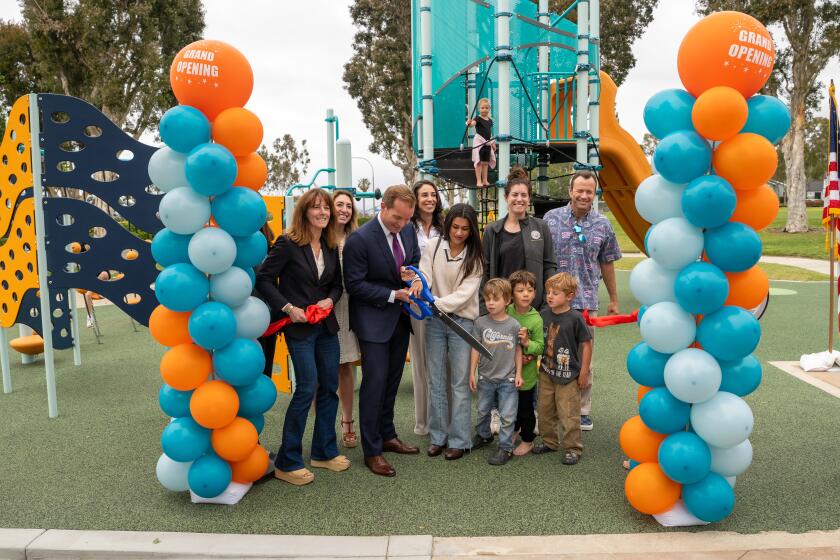Split of money from fairgrounds Kenny Loggins concert spurs call for audit
- Share via
The OC Fair & Event Center is being criticized for what some contend was improperly giving the Pacific Symphony more than $97,000 from a 2017 Kenny Loggins concert at the Pacific Amphitheatre.
The board of directors for the state-owned fairgrounds in Costa Mesa was briefed by staff Thursday about the fairgrounds-symphony partnership that presents a headline musical act with the symphony during the annual summer concert series at the amphitheater.
According to a contract between the two organizations for the Loggins concert, the symphony would retain the proceeds from its subscriptions and sponsors while the fairgrounds would retain proceeds from non-subscription ticket sales, parking and concessions.
After the 2017 concert season, fairgrounds staff compiled a statement of revenue and expenses for the Loggins concert that included a 50-50 profit split of $39,232 for both organizations, according to a staff report.
The Pacific Symphony notified fairgrounds staff last summer that it believed the calculation was incorrect. After reviewing the numbers, the Fair & Event Center agreed that the split actually should be $97,318 each, the report said.
Since the fairgrounds had closed its books for 2017, fairgrounds administrators credited that amount toward about $108,000 the symphony owed the OC Fair & Event Center for its 2018 concerts at the Pacific Amphitheatre.
Local activist Reggie Mundekis said at Thursday’s Fair Board meeting that the contracts for the fairgrounds-symphony partnership contained no mention of a 50-50 split from the Loggins concert. She said that should have been included in the memorandum of understanding between the organizations, noticed for public input and approved by the board.
Mundekis argued that a state auditor should probe whether the dealings between the fairgrounds and Pacific Symphony resulted in gifts of public funds.
“We need someone to come in and take a thorough look at the books,” she said.
“The O.C. fairgrounds is a state agency, and as a state agency we’re supposed to have events that serve the public,” Mundekis said.
According to Fair & Event Center Chief Executive Kathy Kramer, the intent of the original memorandum of understanding was for the event center and the symphony to “share in the success of a co-produced concert during the annual OC Fair. However, the way the deal points were structured was unintentionally inequitable to the symphony for the 2017 co-production. In the spirit of the partnership, the agreement was amended to become a 50/50 split of expenses and resulting revenue.”
The contract amendment for an amount “not to exceed” $97,318 was approved by the board on its consent calendar in September. The consent calendar is a list of items on an agenda that are usually approved all at once without discussion.
John Forsyte, president of the Pacific Symphony, said in an interview that such partnerships and sharing of proceeds are “a very common practice because many nonprofits who are taking risks like to mitigate it by sharing the risks with another nonprofit.”
“Both organizations seek to serve the community with as broad a range of concerts as we possibly can. Everything we are doing at the Pacific Amphitheatre requires extensive fundraising,” he added. Having a successful show like the Loggins concert helps the symphony offset events that don’t fully recoup costs, he said.
But Adam Carleton, the Fair & Event Center’s vice president of finance and administration, said the Loggins concert is an example of questionable accounting practices at the fairgrounds that he’s tried to shed light on.
“This is the tip of the iceberg,” Carleton said.
Carleton alleges that Kramer wrongfully placed him on involuntary paid “administrative time off” on Dec. 11 as part of an effort to conceal employee separation payments detailed in an audit by the California Department of Food and Agriculture. Fairgrounds officials said in January that those payments were part of a separation agreement with a staff member and were in line with an organizational practice that has since been discontinued.
Two months later, the Fair Board voted to prohibit such payments without authorization from the board and the California Department of Human Resources.
Kramer said in January that Carleton’s administrative leave was “not related to the audit or his concerns about the audit.”
Daniel Langhorne is a contributor to Times Community News. Daily Pilot staff writer Luke Money contributed to this report.
All the latest on Orange County from Orange County.
Get our free TimesOC newsletter.
You may occasionally receive promotional content from the Daily Pilot.




